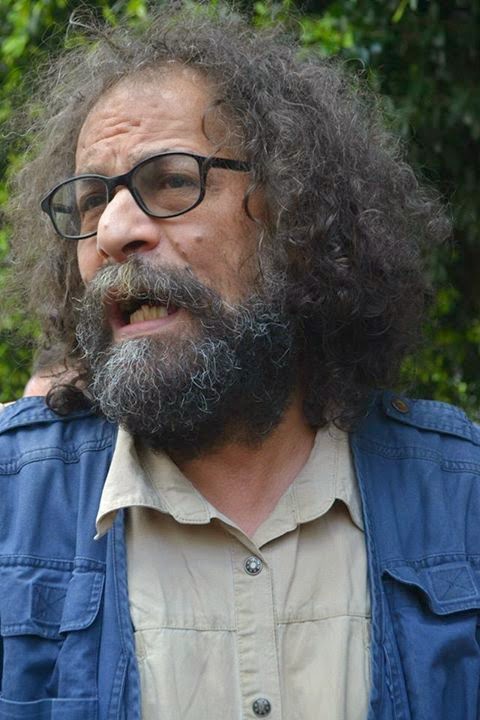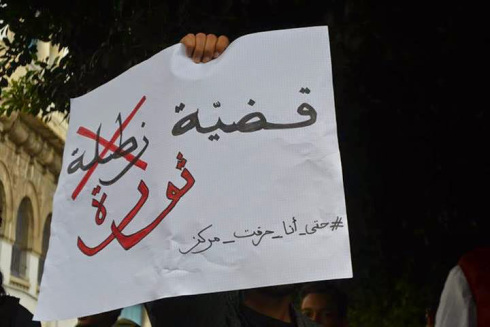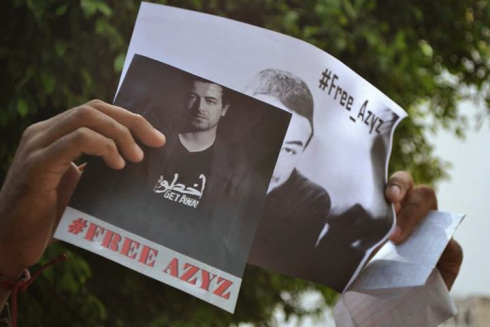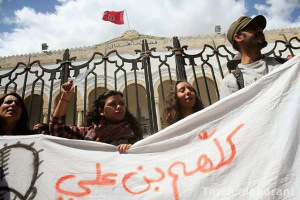“If the Revolution is a crime, then charge all of us”
The world has been applauding Tunisia for its new progressive constitution and new consensus caretaker installed government of technocrats that is administrating the country until elections later this year. However, this celebration seems exclusive to the leadership, members of the National Constituent Assembly, political parties and their allies. In fact, the unemployed, the poor, the student, the worker among other Tunisian citizens are yet to celebrate.
After changing the government five times during the past three years, this current administration has been the most praised for its appearing stability. Nevertheless, if we have a closer look at Tunisia’s internal issues- beside the pictures of the Tunisian Prime Minister shaking hands with Barack Obama-, we will find files of terrorism, corruption, accountability, human rights violations and censorship to be addressed. In fact, abuses are continuing under the interim administration.
Instead of addressing those issues, the ministry of interior, has decided that most importantly to be actually addressed is accountability of criminals and legal cases related to events of the revolution. However, by accountability, the ministry didn’t mean the snipers, the militia who killed over 300 people, the police who injured over 700 people (left non-hospitalized) or even the former corrupt leaders who have stolen the state’s wealth, but accountability applies only to the young revolutionaries who dreamt of social change through their social movement… The ministry, indeed, arrested more than 20 young people (mostly from Menzal Bouzayen) accused of burning police stations back in 2011.
The flow of the ironic events and abusive practices, similar to the old practices of Ben Ali’s Police, started on April 12, when a military court has ordered the release of ousted five security officials served under the former regime. Ali Syriati, former head of the president’s security service, and Rafik Haj Kacem, who served as Minister of Interior from 2004 to 2011 are among the officials who have been released.
On the other hand, thirty-one year old blogger and activist, Azyz Amami, has started a campaign called “I Too Burned a Police Station” to defend demonstrators arrested facing criminal charges for burning police stations in protests during the 2011 revolution. Amamy has publically spoken on TV Ettounsiya in an interview on the talk show Labes accusing the Police of burning their offices as well to destroy archives and files – confirmed with videos and testimonies- he denounced the arrests against youth emphasizing the absence of ballistic report. Azyz is also one of the founders of the independent citizen initiative #AlSajin52 (Prisoner52) for the reform of Tunisia’s notoriously Law 52/1992 , which holds that a citizen found in possession of or having consumed narcotics may be sentenced up to five years in prison and fined up to 3.000 Dinars. He talked about the dilemma of cannabis law, consumption and police corruption.

Khaled Amamy, Azyz’s father
Few days following this show, on May 12, Azyz was arrested in La Goulette, a beachside neighborhood of the capital. Some time between ten and eleven o’clock Monday night, with his friend, photographer Sabri Ben Mlouka, were purportedly pulled over and detained for the possession and use of marijuana. Amamy was beaten by police officers, as confirmed by his father. Both young men may face one to five years in prison, under harsh penalties for drug use, of a law passed more than 20 years ago, baring in mind that out of roughly 25.000 Tunisian prisoners, 8.000 are accused of consumption of drugs. So, the same law Azyz has been mobilizing against, as the campaign grows demanding changes to a law that many call repressive, is now used against him to silence any voice.
The core issue is not actually marijuana, even if the drug test denied by Aziz is proved positive, the real reason for his detention could be as follow;
Azyz is one of the young bloggers associated with the uprising in 2011 and is widely known for his political activism, which imprisoned him under former President Ben Ali. He was psychologically and physically tortured while held in the Ministry of Interior. His reputation as a activist and dissident has earned him notoriety among authorities, particularly his involvement in supporting the families of the Martyrs and injured of the Revolution and his advocacy for the young revolutionaries. Azyz has been blogging against state abuse and police aggression since 2008, and has worked on the Ammar 404 campaign to demand an end to state surveillance and censorship, along with some of Tunisia’s most influential cyber-activists. He is frequently at the forefront of and is considered by many to be an icon of the revolution.

Accordingly, he is now guilty of being militant as the revolution has become a crime under the philosophy of the current leadership. The core issue here is to what extend the police refrains from violent practices incompatible with the second republic dream and values? Fabricated charges of marijuana possession is a classic practice that has traditionally been used by Tunisian authorities both before and after the uprisings to disguise politically motivated arrests. The arrest of Azyz seems to have been planned in a police and judicial matters, used as a pretext to silence an independent and singular voice. This suggests that there is no political will to stop these savage practices with the ongoing arrests of revolutionary youth for marijuana consumption or burning police stations. The same pretext continues to be used to suppress freedom of expression, as it was under the former regime, with a number of artists and musicians jailed on drug charges.
Eventually, the arrest has caused an outcry in Tunis and Azyz’s supporters have also claimed the arrest is politically motivated. Social media has exploded with #FreeAzyz trending on Twitter and Facebook. A protest in support of Azyz took place on May 13 in downtown Tunis. Some of the slogans that have been raised are “Ministry of Interior is Ministry of Terrorism”, “I Too Burned a Police Station”, “Loyals to the blood of Martyrs”, “Free Azyz Free Sabri Free Bou Zayan”, “Down with the Police State”… “If the revolution is a crime, then charge all of us”…
Tunisia’s transition has been seen as a model of compromise and democratic process for a region still in turmoil after the 2011 revolutions that promised new freedoms. However, today, Azyz, Sabri and others remain behind bars of injustice until they face trial on May 23 while Seriati and Bel Haj Kalem, accused of repressing protesters (the same youth in jail) during the uprising are set free. So, is it part of the compromise, to accept ex-Ben Ali officials into politics and imprison the generation of change?
 My full coverage of the Protest at Demotix http://www.demotix.com/news/4748770/manifestation-court-first-instance-tunis-freeazyz
My full coverage of the Protest at Demotix http://www.demotix.com/news/4748770/manifestation-court-first-instance-tunis-freeazyz







